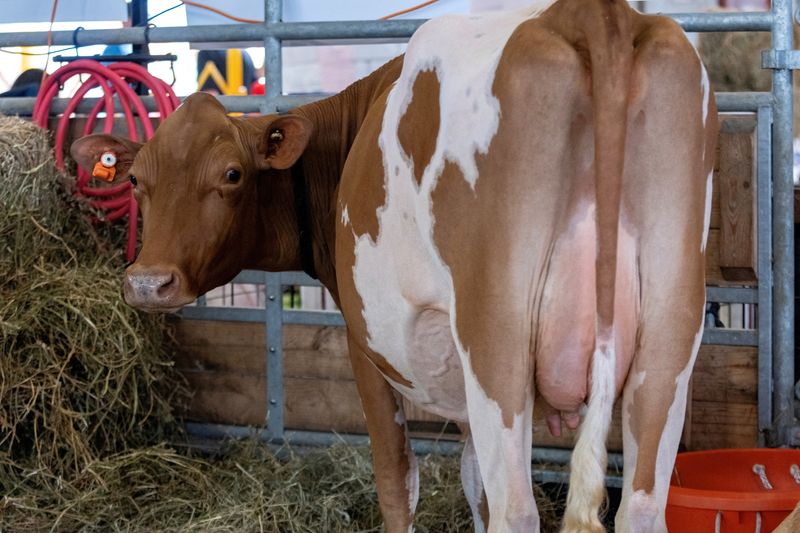By Leah Douglas
(Reuters) - The U.S. Department of Agriculture will soon begin testing bulk raw milk across the country for bird flu, a significant expansion of the agency's efforts to stifle the rapid spread of the virus, Agriculture Secretary Tom Vilsack told Reuters.
The move comes after livestock and veterinary groups pushed the USDA to strengthen its current surveillance approach, calling it inadequate to contain the virus, according to state records and industry documents reviewed by Reuters.
The agency in early November will begin sampling milk in states where dairy cattle have contracted bird flu, including testing specific farms as needed to track the virus' spread, Vilsack said in an interview.
USDA will then begin testing in states that have not identified the virus in dairy cows, he said.
The rapid spread of the virus in California, where nearly 200 dairy herds have tested positive since late August, contributed to the USDA's decision that further surveillance efforts are needed, Vilsack said.
"These situations evolve over time and as they evolve over time there needs to be a recalibration and adjustment," Vilsack added.
The effort adds to an emergency order issued in April that requires testing of cattle moving across state lines, and a USDA program that covers farmers' costs for voluntary testing. Reuters previously reported USDA had softened those rules following pushback from state officials and industry representatives.
Bird flu has infected nearly 400 dairy herds in 14 states and at least 36 people, according to data from the USDA and Centers for Disease Control and Prevention.
Virologists and federal health officials are also concerned the convergence of bird flu and seasonal influenza could enable the bird flu virus to mutate if people become co-infected, making it more easily transmissible among humans.
For now, the CDC has said the danger to the general population remains low.
The U.S. Animal Health Association, whose members include the largest dairy, egg, and poultry trade groups, and the American Association of Bovine Practitioners, a veterinary group, developed recommendations this autumn for how USDA could improve its approach, according to the documents, which have not previously been reported.
The USDA had previously said eliminating bird flu in the nation's dairy cattle was possible using its prior approach.
The agency still wants to eradicate the virus, Vilsack said, adding that Colorado's use of bulk milk testing eliminated new dairy cow cases in the state.
Dairy farmers in some states have resisted voluntary testing of their animals for fear of economic repercussions.
'INADEQUATE'
The U.S. Animal Health Association passed a resolution on Oct. 16 at its annual meeting that emphasized the need for a coordinated state and federal surveillance plan, according to a copy of the document seen by Reuters, which has since been posted on the association web site.
"The narrow requirement of pre-movement testing of only lactating dairy cows moving interstate is inadequate," it said. It recommends instead that the agency coordinate livestock sectors and states in a national surveillance and data collection strategy.
"We can’t wait for a virus to burn out. That strategy has not worked," said Keith Poulsen, director of the Wisconsin Veterinary Diagnostic Laboratory, who has been involved in discussions about the new recommendations.
The American Association of Bovine Practitioners (AABP) in September also drafted recommendations on how the USDA could better contain the virus, with weekly testing of milk tankers, among other strategies, according to emails and a copy of the draft obtained from the Missouri Department of Agriculture in a public records request.
"The disease continues to spread and current voluntary surveillance is inadequate," wrote AABP Executive Director K. Fred Gingrich II to a group listserv on Sept. 28.
He noted that just 50 of the nation's 27,000 dairy herds at the time were enrolled in USDA's voluntary herd testing program, and that 17.6 million commercial poultry birds had been killed after flocks tested positive for the bovine variant of bird flu, suggesting that dairy farms are fueling the virus' spread.
There are now 64 farms enrolled in the voluntary testing program, according to USDA data.

The document was sent on Sept. 30 by Missouri's state veterinarian to other state animal health officials and a USDA official at the Animal and Plant Health Inspection Service, which is managing the agency's bird flu response, the emails show.
The bovine practitioners group’s recommendations came after it had participated in a September meeting of the American Veterinary Medical Association alongside representatives from the poultry, cattle and swine industries, the emails show.